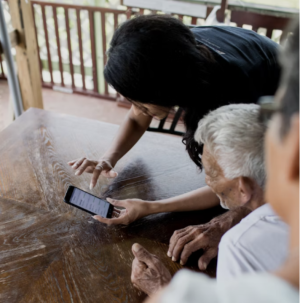Seniors, beware—your online safety could be at risk if you ignore this critical advice
- Replies 0
For many older Americans, using a smartphone or computer can still feel unfamiliar, even intimidating. This makes everyday tasks harder—and leaves many vulnerable to online exploitation.
But an unexpected solution is quietly gaining momentum. It’s not from a tech firm or government agency, but from the mind of a high school student with a heart for change—a simple school project, and now becoming something much bigger.
It began with a lesson on online scams. As a high school student in an AP computer science class, Anabella Alvarez learned how often scammers prey on older adults.
That awareness turned into action after a visit to a local senior living community, where she realized just how many older adults were struggling with technology.
During a visit to a local senior living community, she had a lightbulb moment: “I thought it would be great if someone could organize classes and teach them about technology,” she recalls.
And just like that, CyberWise Seniors was born—a nonprofit dedicated to helping older adults navigate the digital world safely and independently.
Anabella and her team of high school volunteers offer hands-on lessons covering everything from the basics—like sending a text or snapping a photo—to more advanced skills, such as scanning QR codes and spotting online scams.
But it’s not all serious business. One of their most popular activities is Emoji Bingo, a game that helps seniors decode those mysterious little symbols their grandkids keep sending.
There are also technology scavenger hunts, where participants race to solve clues and complete phone-based challenges.
Prizes like gift cards and chocolate-filled mugs add a little extra incentive—and a lot of fun.
You might be wondering: “Do I really need to worry about cybersecurity?”
The answer is a resounding yes. According to the FBI, Americans over 60 lost more than $3 billion to online scams in 2022 alone.
Scammers often target older adults because they believe we’re less familiar with technology and more likely to trust a friendly voice on the phone or a convincing email.
Also read: A new threat shakes trust in a major insurer’s security system
Anabella’s work isn’t only about teaching seniors how to use their phones—it’s about building connections.
“I think the generation gap is growing a lot between us kids and seniors, and a big part of it is communication and technology,” she says. “By having younger people help older people use their phones, it helps strengthen that connection.”
It’s a two-way street: while the seniors learn about technology, the young volunteers gain wisdom and perspective from their elders.
“We have so much to learn from them because they know so many things we haven’t experienced yet, but at the same time, we have things that we can teach them, too. So I think it’s an exchange,” Anabella explains.
Since launching CyberWise Seniors in March 2024, Anabella and her team have hosted about 10 classes at various senior living communities and posted video tutorials online.
The results speak for themselves: seniors who once struggled to send a text are now helping their friends troubleshoot their phones.
“They eventually get to the point where one who was struggling at the beginning can help the others, becoming more of a teacher,” she says with pride.
Read next: Bitcoin scam nearly cost a 73-year-old $20,000—here’s how she was saved

Have you ever been the target of an online scam? Do you have a favorite tech tip to share with your fellow GrayVine readers? Or maybe you’ve had a positive experience learning from a younger family member?
But an unexpected solution is quietly gaining momentum. It’s not from a tech firm or government agency, but from the mind of a high school student with a heart for change—a simple school project, and now becoming something much bigger.
It began with a lesson on online scams. As a high school student in an AP computer science class, Anabella Alvarez learned how often scammers prey on older adults.
That awareness turned into action after a visit to a local senior living community, where she realized just how many older adults were struggling with technology.
During a visit to a local senior living community, she had a lightbulb moment: “I thought it would be great if someone could organize classes and teach them about technology,” she recalls.
And just like that, CyberWise Seniors was born—a nonprofit dedicated to helping older adults navigate the digital world safely and independently.
Anabella and her team of high school volunteers offer hands-on lessons covering everything from the basics—like sending a text or snapping a photo—to more advanced skills, such as scanning QR codes and spotting online scams.
But it’s not all serious business. One of their most popular activities is Emoji Bingo, a game that helps seniors decode those mysterious little symbols their grandkids keep sending.
There are also technology scavenger hunts, where participants race to solve clues and complete phone-based challenges.
Prizes like gift cards and chocolate-filled mugs add a little extra incentive—and a lot of fun.
You might be wondering: “Do I really need to worry about cybersecurity?”
The answer is a resounding yes. According to the FBI, Americans over 60 lost more than $3 billion to online scams in 2022 alone.
Scammers often target older adults because they believe we’re less familiar with technology and more likely to trust a friendly voice on the phone or a convincing email.
Here are just a few of the most common scams targeting seniors:
- Phishing emails that look like they’re from your bank or Medicare, asking you to “verify” your information.
- Tech support scams where someone claiming your computer has a virus and asking for remote access.
- Romance scams that prey on loneliness and trust.
- Fake prize or lottery notifications that ask for payment to claim your “winnings.”
Also read: A new threat shakes trust in a major insurer’s security system
Anabella’s work isn’t only about teaching seniors how to use their phones—it’s about building connections.
“I think the generation gap is growing a lot between us kids and seniors, and a big part of it is communication and technology,” she says. “By having younger people help older people use their phones, it helps strengthen that connection.”
It’s a two-way street: while the seniors learn about technology, the young volunteers gain wisdom and perspective from their elders.
“We have so much to learn from them because they know so many things we haven’t experienced yet, but at the same time, we have things that we can teach them, too. So I think it’s an exchange,” Anabella explains.
Since launching CyberWise Seniors in March 2024, Anabella and her team have hosted about 10 classes at various senior living communities and posted video tutorials online.
The results speak for themselves: seniors who once struggled to send a text are now helping their friends troubleshoot their phones.
“They eventually get to the point where one who was struggling at the beginning can help the others, becoming more of a teacher,” she says with pride.
How you can get Cyber Wise—starting today!
- Never share personal information (like your Social Security number or bank details) over the phone or email unless you’re absolutely sure who you’re talking to.
- Be wary of urgent requests—scammers often try to create a sense of panic to get you to act quickly.
- Use strong, unique passwords for each of your accounts, and consider using a password manager.
- Keep your devices updated—those software updates often include important security fixes.
- Ask for help! Whether it’s a grandchild, a neighbor, or a local community group, don’t be afraid to reach out if something doesn’t seem right.
More safety tips for YOU and your loved ones:
These trusted resources break down some common and unusual risks—and how to avoid them—in ways that are easy to follow.- How to be cautious when “connected”
- How to protect seniors from financial scams
- The one red flag that could stop a bank scam before it starts
- Think twice before sharing that viral post—it could be a scam
Read next: Bitcoin scam nearly cost a 73-year-old $20,000—here’s how she was saved
Key Takeaways
- Anabella Alvarez, a high school student from Miami, founded CyberWise Seniors, a nonprofit that teaches older adults how to use technology safely.
- Her classes include lessons on texting, QR codes, scam avoidance, and fun games like Emoji Bingo to boost digital confidence.
- Since launching in March 2024, she’s hosted around 10 sessions at senior living centers and posted tutorials online, with help from over 10 student volunteers.
- The initiative aims to bridge generational gaps and foster relationships while making seniors more digitally secure and independent.







